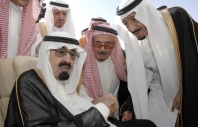Saudi Arabia’s King Abdullah criticized international inaction on Friday over the Zionist offensive in Gaza, which he described as involving mass slaughter and "war crimes against humanity".
 Saudi Arabia's King Abdullah criticized international inaction on Friday over the Zionist offensive in Gaza, which he described as involving mass slaughter and "war crimes against humanity", in a speech read out on his behalf on state television.
Saudi Arabia's King Abdullah criticized international inaction on Friday over the Zionist offensive in Gaza, which he described as involving mass slaughter and "war crimes against humanity", in a speech read out on his behalf on state television.
"This (international) community which has observed silently what is happening in the whole region, was indifferent to what is happening, as if what is happening is not its concern. Silence that has no justification," he said in his speech.
Saudi Arabia sees itself a main player in the Middle East, but has played only a low-key role in diplomatic efforts to end the conflict in Gaza, leaving the main Arab efforts to its close ally Egypt and fellow Gulf monarchy Qatar.
"We see the blood of our brothers in Palestine shed in collective massacres that did not exclude anyone, and war crimes against humanity without scruples, humanity or morality," Abdullah said in a brief speech read out on his behalf on state television.
His speech, which focused mainly on what he described as a Middle East-wide threat from militancy, followed criticism by some Saudis on social media, including prominent clerics, over Riyadh's quiet response to the Gaza crisis.
The kingdom's policy towards Gaza shadowed by its views on Hamas, a movement with close ideological and political links to the Muslim Brotherhood, which Riyadh regards as a terrorist organization.
Abdulkhaleq Abdullah, a political analyst in the United Arab Emirates, said the speech was a bid to rebut accusations that Saudi Arabia - along with allies Egypt and the UAE - was happy to see Hamas weakened by the Zionist offensive.
"People want to see a stronger position from these three countries and it is not coming over very strongly," he said.
The kingdom's muted response to the crisis so far has been echoed across a region already absorbed by a series of civil wars, insurgencies and internal political strife that have erupted in the aftermath of the 2011 Arab uprisings.
Since the Zionist air and ground onslaught began, Saudi Arabia's public expressions of condemnation over the violence have been mostly limited to statements following the weekly cabinet meetings, and to pledges of humanitarian aid.
Newspaper coverage, which often follows the official line in Saudi Arabia, has often relegated the conflict to inside pages in sharp contrast to previous Israeli incursions into Gaza.
In his speech, Abdullah condemned militants who he said were killing innocent people and mutilating their bodies in contravention of Islamic teachings.
He also called on the region's leaders and religious scholars to prevent Islam from being hijacked by militants.
He further said he was disappointed by the lack of any follow-up from other countries to his proposal two years ago to establish an international center to combat terrorism.
Israel launched its offensive in Gaza on July 8, unleashing air and naval bombardments. Tanks and infantry pushed into the territory of 1.8 million on July 17.
Gaza officials say at least 1,500 Palestinians, mostly civilians, have been killed and 7,000 wounded. Sixty-one Zionist soldiers have been killed and more than 400 hurt. Three civilians have been killed by Palestinian rockets in Occupied Territories.